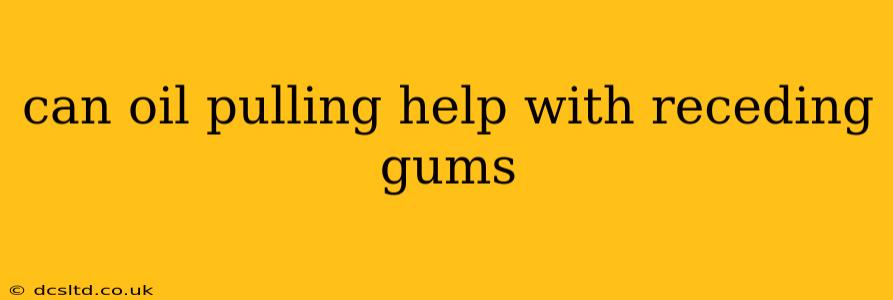Receding gums, a common dental problem, can lead to sensitivity, tooth decay, and even tooth loss. While oil pulling has gained popularity as a natural remedy for various oral health issues, the question remains: can it truly help with receding gums? Let's explore this thoroughly.
The short answer is: oil pulling may offer some benefits for oral health, but it's unlikely to reverse or significantly improve receding gums on its own. While it might help improve overall oral hygiene, it doesn't address the underlying causes of gum recession.
What is Oil Pulling?
Oil pulling involves swishing oil (typically coconut, sesame, or sunflower) in your mouth for 10-20 minutes to draw out bacteria and toxins. Proponents claim this improves oral hygiene, whitens teeth, and reduces inflammation. However, scientific evidence supporting these claims is limited and often based on anecdotal evidence.
How Does Gum Recession Occur?
Gum recession is primarily caused by:
- Aggressive brushing: Using a hard-bristled toothbrush or brushing too vigorously damages gum tissue.
- Gum disease (periodontitis): This bacterial infection inflames and destroys the tissues supporting your teeth.
- Genetics: Some individuals are genetically predisposed to gum recession.
- Grinding or clenching teeth: This puts excessive pressure on the gums.
- Hormonal changes: Fluctuations in hormones can affect gum health.
- Smoking: Smoking weakens the immune system and increases the risk of gum disease.
Can Oil Pulling Help Prevent Further Gum Recession?
While oil pulling itself won't reverse receding gums, it might contribute to better overall oral hygiene by reducing bacteria in the mouth. A cleaner mouth can potentially slow the progression of gum disease, thus indirectly helping to prevent further recession. However, this is not a substitute for professional dental care.
Does Oil Pulling Treat Gum Disease?
No. Oil pulling is not a treatment for gum disease. Gum disease requires professional intervention, including scaling and root planing (deep cleaning) to remove bacterial plaque and tartar from below the gum line. In advanced cases, gum surgery might be necessary.
What are the benefits of oil pulling?
While oil pulling's efficacy in treating receding gums is unproven, some benefits to overall oral health are suggested:
- Improved oral hygiene: By removing some bacteria, oil pulling might contribute to fresher breath and a cleaner mouth.
- Reduced inflammation (possibly): Some studies suggest a reduction in inflammation markers, although more research is needed, especially concerning gum health.
- Improved oral health in conjunction with standard practice: Oil pulling can be a supplemental practice when used with regular brushing, flossing, and professional dental cleanings.
What are the risks of oil pulling?
- Choking hazard: Swallowing the oil can be dangerous.
- Not a replacement for professional dental care: Relying solely on oil pulling for gum disease or receding gums can be detrimental.
- Potential allergic reactions: Allergic reactions to the oil used are possible.
What should I do if I have receding gums?
See a dentist or periodontist immediately. They can diagnose the cause of your receding gums and recommend appropriate treatment, which may include:
- Improved brushing techniques: Learning proper brushing techniques is crucial.
- Scaling and root planing: A deep cleaning to remove plaque and tartar.
- Gum surgery: In more severe cases.
In conclusion: While oil pulling might offer some minor benefits for overall oral health, it cannot treat or reverse receding gums. Professional dental care is essential for managing and treating receding gums and preventing further complications. Consider oil pulling as a supplemental practice, but never as a replacement for regular dental checkups and professional treatment.
